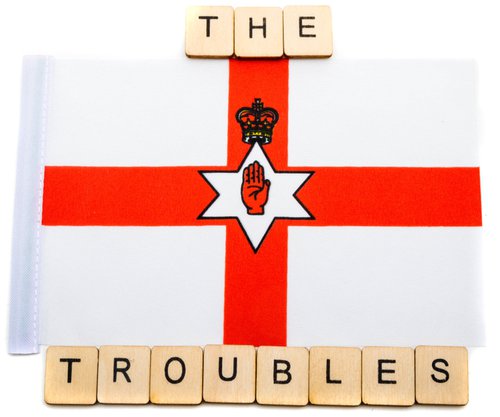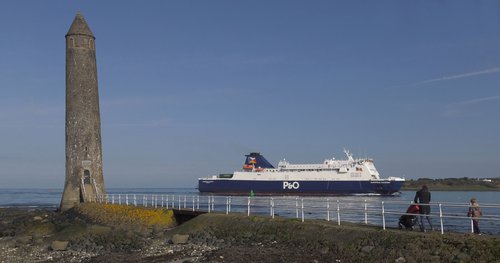Conflict, Memory and Migration: Northern Irish Migrants and the Troubles in Great Britain was a collaborative oral history research project that brought together researchers from the universities of Manchester, Brighton and Liverpool to investigate a largely unexplored aspect of Irish and British social history: the intertwined histories of the Northern Ireland Troubles (c.1969-1998) and of emigration from the North of Ireland to Great Britain in the years before, during and after the conflict. [1]
While there is considerable scholarship on the history and culture of Irish migrants and their descendants in England, Scotland and Wales, little academic attention has been paid to the experiences and memories of the tens of thousands of Northern Irish people who have lived, worked and settled in Great Britain since 1960. [2] We set out to change this by examining the interrelationship between the Troubles – a seismic conflict with complex causes that was located within the borders of the modern United Kingdom nation-state, but with deep roots in its imperial past – and the shaping of distinctive forms of Northern Irish subjectivity in the ‘diaspora space’ of contemporary Britain, with a specific focus on three locations, namely, the city regions of London, Manchester and Glasgow. [3]
Although precise figures are hard to come by, statistical analysis indicates that approximately 200,000 people departed Northern Ireland for Britain between the first sectarian killings in Belfast in 1966 and the republican and loyalist paramilitary ceasefires of 1994. [4] Many of these newcomers put down roots, forged careers and raised families in their adopted communities, and while not all became permanent residents, the 2001 UK Census revealed that there were over 295,000 Northern Ireland-born people living in Britain at the turn of the century, making this ‘Britain’s fourth largest born-abroad group’. [5] Despite their societal embeddedness, the histories and positionalities of these migrants have been little studied; and if the lives and identities of the first generation are sparsely documented, then those of their sons and daughters are even more in shadow.


Our desire to investigate the distinctive migration stories and subjectivities of this overlooked multigenerational population was accompanied by a wish to address the understudied social, cultural and political impacts of the Troubles in British civic society. Even with the benefit of considerable hindsight, there is a tendency in some quarters to view the undeclared civil war in the North of Ireland as marginal to the wider development of the post-imperial British state, thus suggesting that little has changed since the outbreak of the conflict in 1969, when ‘it could be treated as having nothing to do with Britain other than in a legal/constitutional sense’. [6] Our project aimed to challenge this amnesia by connecting the histories of migration and warfare in the transcultural space of ‘the British Isles’, using personal memories of migration to explore how the contested impacts and legacies of the Troubles articulated across the internal borders of the plurinational United Kingdom. By these means, we aimed to contribute to the developing scholarship on the complex afterlife of the British state’s longest, largest and most controversial military campaign of the twentieth century, one that was waged against a sizeable disaffected minority of its own citizenry, yet which was often remote from British public consciousness and disavowed by influential sections of the country’s political establishment.
An oral history methodology appealed to us as the most effective means by which to pursue answers to our questions relating to the triple themes of conflict, memory and migration. As a multidisciplinary team, we share an affinity with other social and cultural researchers who value orally narrated life stories as ‘complex texts mediated by collective ideologies and diverse conditions of cultural production’. [7] We also value the historicised narratives of selfhood that personal memory narratives produce, both for their power to supplement and alter the historic record by illuminating the particularities of individual lives, and for the insights they offer into the layered complexities of memory, emotion, subjectivity and historical experience. The privileged access that oral history provides into the deep-seated experiential, affective and embodied dimensions of people’s lives, as expressed in their own words, is especially valuable when investigating the experiences of those who have been culturally or historiographically marginalised, as it is in societies where historical memory is politically contested and selectively memorialised. These conditions were salient features of our project, and they are also central to the many testimony-gathering initiatives that have in recent years contributed to the sustained uncovering of historical injustices, human rights abuses and sublimated traumas in both political jurisdictions on the island of Ireland.

Notes
[1] Northern Ireland’s politically contested status means that a variety of names are applied to the region, each of which implies a particular ideological perspective on the place and its history. In recognition of this, we use the terms ‘Northern Ireland’, ‘the North of Ireland’, ‘the North’, ‘Ulster’ and ‘the Six Counties’ interchangeably when writing about our project and research findings.
[2] For a useful bibliographical guide to the scholarship on the Irish in Britain, see Donald M. MacRaild, The Irish Diaspora in Britain, 1750-1939 (Basingstoke: Palgrave Macmillan, 2011), pp. 253-65. See also the annotated bibliography maintained by Irish in Britain, the umbrella body for Irish community organisations in Britain, at https://www.irishinbritain.org/what-we-do/publications/bibliography-of-research.
[3] In Cartographies of Diaspora: Contesting Identities (London: Routledge, 1994), Avtar Brah defines diaspora space as an intersectional site that is occupied ‘not only by those who have migrated and their descendants, but equally by those who are constructed and represented as indigenous’ (p. 209).
[4] We have derived this figure from the available statistics on total net migration summarised in Johanne Devlin Trew, Leaving the North: Migration and Memory, Northern Ireland 1921-2011 (Liverpool: Liverpool University Press, 2013), pp. 48-54. Actual emigration numbers may be greater. From the 1960s to the end of the 1980s, emigration ‘in some years amounted to over 10,000 individuals, with the conflict evidently having a significant impact’ (p. 51), particularly during the 1970s and in 1981, the year of the republican hunger strikes in the Maze/Long Kesh prison. Trew estimates that 70 per cent of all emigration since the 1960s was to Great Britain.
[5] Johanne Devlin Trew, ‘Negotiating Identity and Belonging: Migration Narratives of Protestants from Northern Ireland’, Immigrants and Minorities, vol. 25, no. 1 (2007), p. 28.
[6] Mary J. Hickman, ‘Irish Britain’, in The Routledge International Handbook of Irish Studies, ed. Renée Fox, Mike Cronin and Brian Ó Conchubhair (London: Routledge, 2020), p. 153.
[7] Graham Dawson, Making Peace with the Past? Memory, Trauma and the Irish Troubles (Manchester: Manchester University Press, 2007), p. 27.



